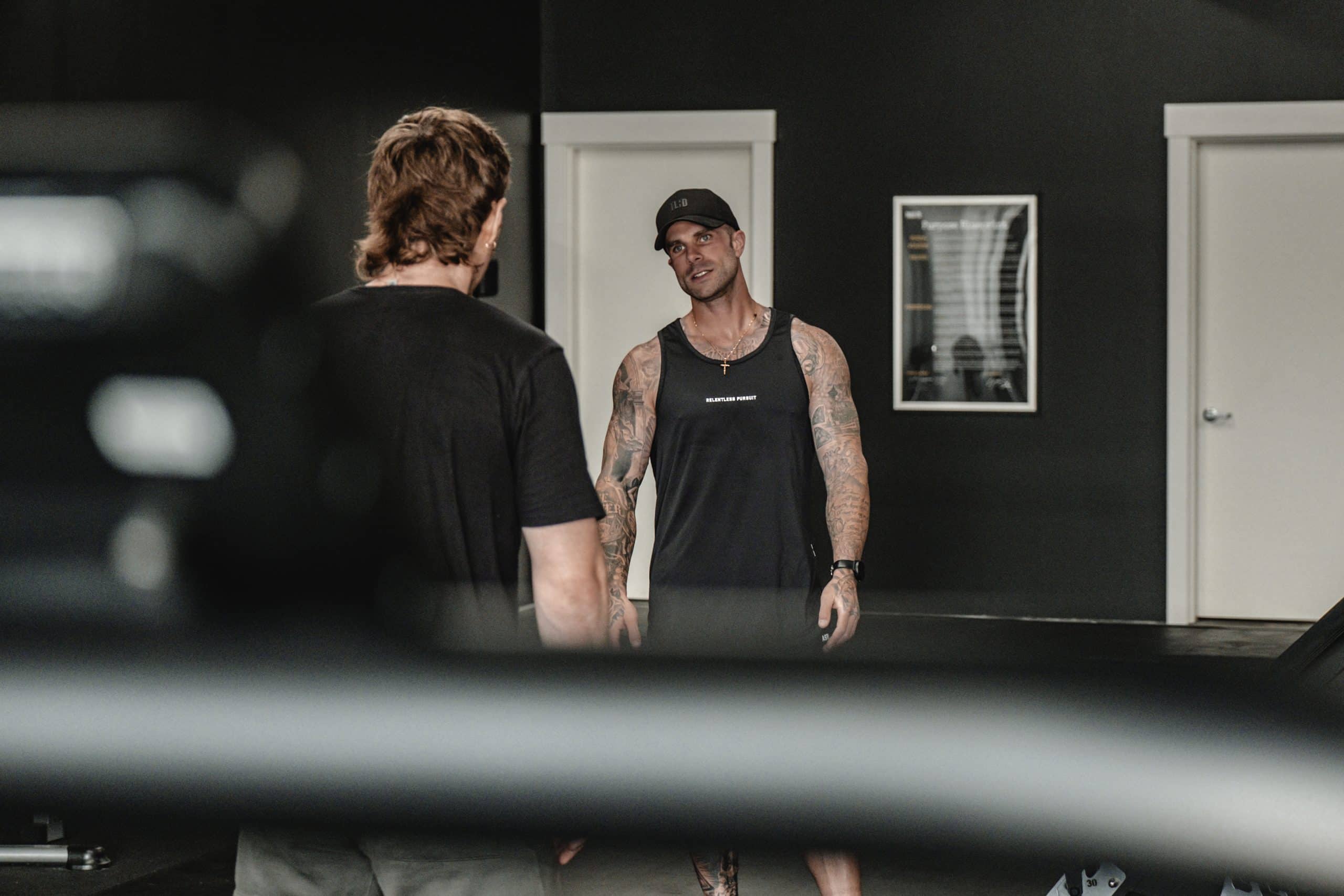If you want to get lean, build muscle, run a business, or achieve anything meaningful in life, you need more than just motivation. Motivation may get you started, but it’s fleeting. The moment you’re tired, stressed, or bored, motivation disappears.
What takes its place?
Self-control.
Decades of research show self-control is a stronger predictor of long-term success than intelligence, talent, or even socioeconomic background. Kids with higher self-control grow into adults who are healthier, wealthier, and more likely to thrive in relationships. Adults with stronger self-control make better financial decisions, sustain healthy habits, and lead more fulfilling lives.
So if you want to change your body, transform your habits, or chase bigger goals, this is the skill to focus on. And the good news? Self-control isn’t a trait you’re born with or without. It’s something you can build.
If you want to listen to the part 1 of our podcast series on what we call the “Self-Formation Process”, which is solely focused on Self-Control and the research backing up it’s importance, how it’s developed, and how YOU can gain more of it — you can find it on Spotify HERE, Apple Podcasts HERE, or YouTube HERE.
Self-Control vs. Self-Discipline: The First Step in the Chain
It’s like this:
-
Self-control is the first step. It’s the momentary ability to resist temptation—choosing not to grab the donut, not to scroll Instagram, not to skip the workout.
-
Self-discipline is what grows when you practice self-control repeatedly. Over time, those small decisions become habits, and habits become who you are.
-
From there, you build self-belief—confidence that you can stick to your word.
-
And ultimately, you earn self-respect—the foundation of your identity and integrity
That’s why it’s important to emphasize: self-control is where it starts. You can’t skip it. It’s the first brick in building a life you’re proud of.
Why Self-Control Matters More Than You Think
We live in a world designed to test your self-control. Instant gratification is everywhere: social media, fast food, streaming apps, shopping at the click of a button. Every time you resist, you’re swimming against the current.
But here’s the thing: the benefits extend far beyond that one choice.
-
Health: Self-control determines whether you stick to workouts, nutrition plans, and recovery habits. Without it, the short-term hit of sugar or skipping the gym always wins. With it, you stay consistent long enough to actually see results.
-
Career: It’s what keeps you focused on deep work instead of scrolling emails or Slack all day. People with strong self-control aren’t necessarily smarter—they’re just less distracted, and over years, that compounds into promotions, business growth, and financial security.
-
Relationships: Self-control helps you listen instead of snapping, show patience instead of anger, and build trust. Without it, emotions control you. With it, you control your emotions.
-
Finances: From saving instead of overspending to investing for the long term, self-control drives financial security. It’s not about denying yourself forever—it’s about creating freedom later by making better decisions now.
Without it, you’re reactive—controlled by impulses, cravings, and distractions. With it, you’re proactive—choosing long-term growth over short-term comfort.
“The difference between people who succeed and people who don’t isn’t talent. It’s not luck. It’s self-control. It’s the ability to say no to what you want right now for what you want most.”
The Science of Self-Control: What Research Shows

Let’s break down four key findings from decades of psychology and neuroscience research. These studies show not just what self-control is, but how you can build it.
1. Your Environment Shapes Your Discipline
Study: Breaking Beyond the Borders of the Brain: Self-Control as a Situated Phenomenon
For years, we thought willpower was purely internal—a matter of mental toughness. But research shows it’s deeply influenced by your environment.
-
Clenching your muscles can temporarily boost willpower.
-
Calm, orderly spaces reduce stress and improve your ability to resist distractions.
-
Supportive social circles strengthen discipline. Being around driven people helps you stay accountable.
Why It Matters: If your environment is cluttered with temptations, your self-control will always feel harder. But if you engineer your surroundings to support your goals, discipline becomes easier.
How This Creates Freedom: Once your environment supports your goals, you don’t waste energy fighting battles all day. You’re not constantly wrestling with temptation—you’re free to focus on growth. Imagine walking into a kitchen where junk food doesn’t exist, or starting your workday at a desk with zero distractions. That freedom from noise is what allows creativity and consistency to flourish.
Practical Application:
-
Tidy your space before work or study.
-
Remove temptations—don’t keep junk food in the house.
-
Surround yourself with people who live the habits you want to build.
2. Ego Depletion: Do We Really Run Out of Willpower?
Study: Ego Depletion and the Strength Model of Self-Control: A Meta-Analysis
The old theory was that willpower is like a gas tank—you use some up, and eventually, it runs dry. But newer research paints a more nuanced picture.
Across 83 studies, people often performed worse on a second self-control task. But here’s the twist: beliefs about willpower made a huge difference. If people believed their willpower was limited, they gave up faster. If they believed they had more in the tank, they kept going.
Why It Matters: Self-control is partly mindset. If you think you’re “out of willpower,” you’ll act like you are. But if you see self-control as a skill—something that strengthens with use—you can push past that barrier.
How This Creates Freedom: Think about how many times you’ve told yourself, “I just don’t have the energy to work out,” or, “I’ve already blown my diet today, I might as well give up.” Those are beliefs, not facts. By shifting your mindset, you free yourself from the excuse of being “out of gas.” That freedom lets you stay consistent when others quit.
Practical Application:
-
Reframe self-control as a muscle, not a gas tank.
-
Instead of saying, I’m drained, say, I’m training my discipline.
-
Use small wins to prove to yourself you’ve got more left.
3. Your Brain’s Response to the Future Predicts Your Discipline
Study: Predicting Real-Life Self-Control From Brain Activity Encoding the Value of Future Outcomes
Researchers put participants in an fMRI scanner and asked them to think about future rewards. Then they tracked their daily habits.
The results? People whose brains lit up more when visualizing future rewards had better self-control in real life. They exercised more, ate healthier, and used screens less.
Why It Matters: Discipline is easier when the future feels real. If you can vividly imagine the payoff—your leaner body, your thriving business, your stronger relationships—you’ll find it easier to resist short-term urges.
How This Creates Freedom: Most people are slaves to the present moment—they trade long-term happiness for short-term comfort. But if you can anchor yourself to the future, you break free from that trap. Suddenly, you’re not chained to every craving or impulse. You’re free to pursue what truly matters because the future you want feels more compelling than the temporary pleasure in front of you.
Practical Application:
-
Journal daily about your long-term goals.
-
Use visualization: picture how you’ll look, feel, and live when you stick to your habits.
-
Keep visual cues around you—photos, quotes, or reminders of your future self.
4. Sleep Loss Makes Self-Control Collapse
Study: Sleep Deprivation Promotes Habitual Control Over Goal-Directed Behavior
When you’re sleep-deprived, your brain shifts from goal-oriented decision-making to habit-driven impulses. That means you’ll default to scrolling, snacking, or skipping workouts.
Why It Matters: Discipline isn’t just about mental toughness—it’s about physiology. If you don’t sleep, your brain literally can’t regulate impulses effectively.
How This Creates Freedom: Sleep is the foundation of mental clarity. When you protect it, you free yourself from living reactively. You’re sharper, calmer, and more intentional. That freedom means you can actually use your discipline for growth, instead of wasting it battling fatigue.
Practical Application:
-
Treat sleep like a training session—7+ hours minimum.
-
Build a nighttime routine that signals your body it’s time to rest.
-
Protect your mornings by not sabotaging your nights.
From Research to Real Life: Building Self-Control Daily

Understanding the science is only half the battle. Here are five practical strategies you can implement right away to strengthen your self-control. And more importantly—I’ll explain why each one matters for your freedom, consistency, and success.
1. Shift Your Mindset About Willpower
Stop believing it’s limited. Think of it as a skill that grows with use.
Why It Helps: If you view self-control as finite, you’ll quit at the first sign of fatigue. But when you see it as something that strengthens with every rep, you’ll lean into discomfort instead of running from it. Over time, that mindset shift compounds into resilience.
2. Practice Future Thinking Daily
Spend 5–10 minutes each day visualizing your goals. Journaling and meditation are powerful tools for this.
Why It Helps: The clearer your future feels, the easier it becomes to resist present distractions. When you see yourself strong, lean, and thriving, you’re less tempted by the donut or the snooze button. You’re free to act in alignment with your future self instead of your impulses.
3. Train Self-Control With Small Wins
Build momentum with low-stakes, repeatable challenges: cold showers, finishing your tasks before relaxing, or setting a daily “no snooze” rule.
Why It Helps: These micro-disciplines train your brain. Each small victory tells your subconscious: I’m someone who follows through. Over time, that identity bleeds into bigger areas—your fitness, business, and relationships.
4. Engineer Your Environment
Design your surroundings to make the right choice easy and the wrong choice hard.
Why It Helps: Willpower is weakest in the heat of the moment. By changing your environment ahead of time—like laying out workout clothes or blocking apps—you free yourself from unnecessary battles. This creates margin for your discipline to focus on what actually matters.
5. Prioritize Health
Sleep, nutrition, and exercise aren’t luxuries. They’re the biological foundation of discipline.
Why It Helps: When your body is depleted, your self-control crumbles. But when you’re rested, fueled, and strong, you’re free to use your discipline where it counts—pursuing goals, building relationships, creating impact.
How Self-Control Creates Freedom
This is the paradox most people miss: self-control isn’t about restriction. It’s about liberation.
-
When you control your diet, you’re free from health problems that hold you back.
-
When you control your schedule, you’re free to spend time on what matters most.
-
When you control your emotions, you’re free to build stronger, deeper relationships.
-
When you control your spending, you’re free to build wealth and opportunities.
Without self-control, you’re not free—you’re enslaved to every craving, distraction, and emotion. With it, you unlock freedom in every domain of life.
“Every time you choose hard—when you take the stairs instead of the elevator, when you skip the snooze button, when you put down the cookie—you’re casting a vote for the person you want to become. Over time, those votes add up. That’s how you build self-control. That’s how you build freedom.” – Cody McBroom
Self Control Podcast Transcript
Final Thoughts: Choose Hard, Take Control
Nobody is born with perfect self-control. It’s built, one choice at a time.
-
It starts with resisting the small urges.
-
It grows into daily discipline.
-
It evolves into belief and self-respect.
That’s the process. That’s the path.
So here’s your challenge: pick one strategy from this article and start today. Don’t wait for motivation. Don’t wait for the “right time.” Self-control is built in the moment you say no to what you want now for what you want most.
Choose hard. Build control. And watch every area of your life transform.
Watch the full episode on self-control on the Choose Hard Podcast here:













































































































































































































































































































































































































































































